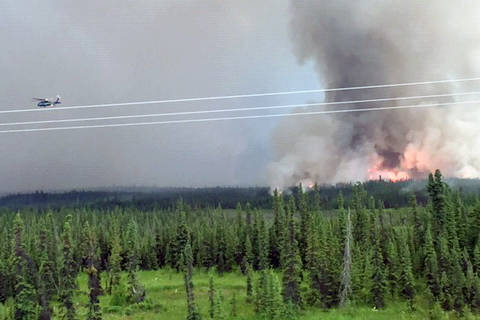Increased wildfire activity and persistent dry conditions have prompted the Alaska Department of Natural Resources to ban all campfires in several parts of the state, including the Kenai Peninsula.
According to a release from the DNR, “all campfires, even those in established fire pits or rings in designated campgrounds, are prohibited until further notice.” This includes fires for cooking, warming or signaling. Suspensions for burn permits are also still in place, meaning people cannot get permits or use their permits for open debris piles or burn barrels right now.
The campfire restriction is in place not only on the peninsula, but in Anchorage, the Mat-Su, the Denali Borough, the Copper River Valley and more. It’s in response to the 122 active wildfires burning across the state, according to the release.
The campfire ban is in effect on not only state land, but also private and municipal lands. That means within the city of Homer as well as in Kenai Peninsula Borough land, including city campgrounds and beaches. The restrictions will stay in place until weather conditions improve, the release states.
In an edited version of the DNR press release, members of the Homer Volunteer Fire Department gave people resources for reporting illegal burn activity. To report an illegal campfire or fireworks in Homer, call the Homer Police Department at 907-235-3150. If it’s outside city limits, call the Alaska State Troopers at 907-235-8239.
The following cooking methods are still allowed and not affected by the ban: charcoal grills, gas grills and stoves that use fuel or compressed canisters.
Rain is forecasted to fall on many parts of Alaska starting this weekend, but Alaska Division of Forestry Public Information Officer Tim Mowry said it’s not likely going to be enough to lift the burn ban.
“The high pressure system is going to break down a little bit, but that’s not going to result in any widespread precipitation,” he said.
Essentially, it won’t be enough rain to significantly impact the fires. There’s also lightning in the forecast, Mowry said, which is how several fires, including the Swan Lake Fire burning near Sterling, got started. With all this in mind, the Division of Forestry can’t take any chances of added any human-caused fires to the mix, he said.
Alaska just doesn’t have the resources to respond to these many fires at once.
“We’re scrambling to try to find the personnel to respond to initial attacks, to respond to new fires,” Mowry said.
Since the campfire ban is in effect in municipalities as well, it’s going to exclude fires of any kind on Homer’s beaches and out on the Homer Spit. Mowry said that while fires near the water doesn’t seem dangerous, the Division of Forestry can’t make exceptions for anyone and that campers can never be too careful. As seen by charred driftwood at Bishop’s Beach and the Spit, it has happened that campfires near large driftwood log piles have gotten out of control.
All it takes is a runaway ember blown by wind up into some dry grass to start another blaze.
“At this point, you know, we’d rather be safe than sorry,” Mowry said.
He said that Alaskans can help by staying vigilant.
“Just be careful, especially now,” he said. “A lot of parts of Alaska are a tinder box right now. Things are so dry. We say it all the time, but it only takes a spark.”
The release from the Homer Volunteer Fire Department adds that people should call 911 if smoke or fire are seen. For more information about the burning suspension in place on the peninsula, call:
■ Homer Volunteer Fire Department: 907-235-3155
■ Kachemak Emergency Services: 907-235-9810
■ Anchor Point Fire and Emergency Services: 907-235-6700
Reach Megan Pacer at mpacer@homernews.com.


